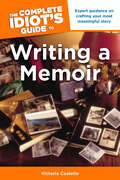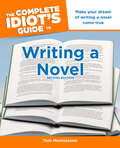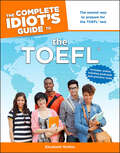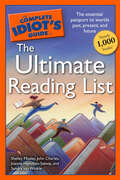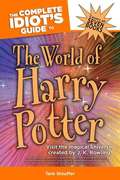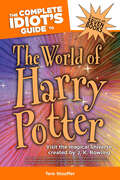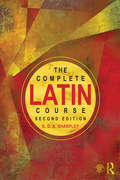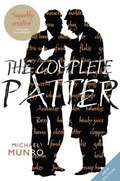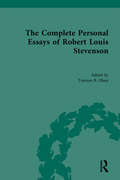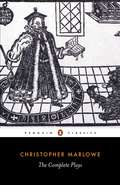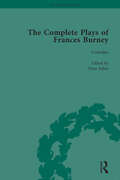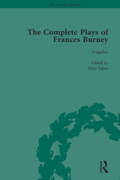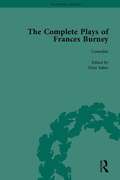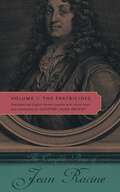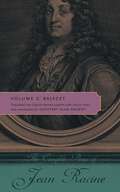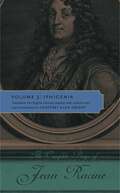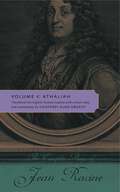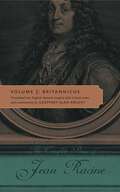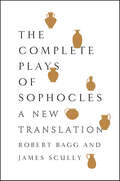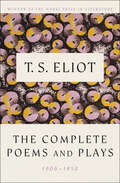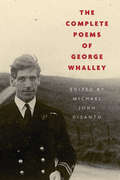- Table View
- List View
The Complete Idiot's Guide to Writing a Memoir: Expert Guidance on Crafting Your Most Meaningful Story
by Victoria CostelloHelps readers write memoirs, personal essays, and life stories of every length and type.
The Complete Idiot's Guide to Writing a Novel, 2nd Edition: Make Your Dream of Writing a Novel Come True
by Tom MonteleoneA completely updated guide for first-time novelists Completely revised to include new interviews with best-selling authors; more detailed information on writing genre fiction from paranormal romance to cozy mysteries; and everything a writer needs to know about self-publishing and ebooks to get started. The Complete Idiot's Guide® to Writing a Novel, Second Edition, is an indispensable reference on how to write and publish a first novel. • Expert author with over thirty published novels • Includes interviews with new best-selling novelists • Features new material on writing genre fiction and self-publishing
The Complete Idiot's Guide to the TOEFL®: The Easiest Way to Prepare for the TOEFL Test
by Elizabeth RollinsUnlike other test prep books, this guide covers both the paper-based and the Internet-based test. With supplemental online podcasts, as well as clear prose, ample practice questions, easily digested chapters, and two full practice tests, this Complete Idiot's Guide® is an essential addition to any non-English speaker preparing for admission at more than 8,500 colleges and universities in English-speaking countries.
The Complete Idiot's Guide to the Ultimate Reading List
by John Charles Shelley MosleyGreat reads for busy people. This is a guide to help busy people find great reads in fiction and nonfiction. Filled with recommendations of popular, entertaining reading, this book covers mystery and suspense, romance, women&’s fiction and chick lit, Westerns, science fiction, such nonfiction topics as animals, art, biography, memoirs, business, true crime, and more. Plus, each entry includes a summary of the book, its significance, and a critique/observation/comment.
The Complete Idiot's Guide to the World of Harry Potter
by Tere StoufferYou're no idiot, of course. J. K. Rowling's Harry Potter novels have captured the imaginations of readers of all ages who have become enchanted by Harry's story. And like so many other wizards of words, there's more to Rowling's magical storytelling than meets the eye. The Complete Idiot's Guide® to the World of Harry Potter reveals the inspirations and influences behind one of literature's most beloved creations. In this Complete Idiot's Guide®, you get: * An entertaining look at the history, mythology, science, and folklore found in all seven Harry Potter novels. * A guide to the magical creatures populating Harry's world. * A day in the life of a wizard. * Spells, charms, potions, and other magical methods. TERE STOUFFER earned her Master's degree in children's literature at Hollins University. Her 2001 graduate paper detailing the differences between J. K. Rowling's magical world and those of C. S. Lewis and Lewis Carroll established her as one of the first Harry Potter Scholars in the nation. In 2005 and 2006, she was invited to present papers at the prestigious Children's Literature Association International conference. Learn more about the magical world. * Explore the origin of the magical creatures you'll encounter. * Discover what equipment a wizard needs to keep on hand. * Uncover the power of plants and herbs. * Find out which games have been around for centuries, and which are brand-new. * Study the formulas for draughts and potions. * Learn the "King's English" for the meanings of British and wizarding terminology.
The Complete Idiot's Guide to the World of Harry Potter
by Tere StoufferFor fans of all ages. Here is an entertaining and easily referenced presentation of insider information to the world that J. K. Rowling has created in her spellbinding series of novels. The Complete Idiot&’s Guide® to the World of Harry Potter explores all aspects of the wizarding world and explains them in terms of their relationship to historical, literary, religious, scientific, or mythological roots.—In-depth information on the facts behind all seven books in the Harry Potter series. —Covers all the relevant influences for the Harry Potter series, from religion and mythology to science and literature. —Can be read from cover to cover or used as a quick-reference guide.
The Complete Latin Course
by G D SharpleyThe Complete Latin Course is a comprehensive introduction to Latin for students and armchair enthusiasts alike. This modern, user-friendly text offers a series of fascinating glimpses into the world of ancient Rome, and sets you up to read Virgil, Cicero, Juvenal, Tacitus and many other authors in the original Latin. The story of Rome is told by the ancient authors themselves. Authentic texts help to guide the student through the mechanics of Latin, whilst giving insights into the history of Rome, her culture and society, her gods, her games, her power struggles and the eventual fall of empire. Originally published as Essential Latin, this extensively revised and expanded second edition features: Reading passages from Latin prose authors, including Cicero, Petronius, Pliny, Sallust, Suetonius and Tacitus, and from poets (Catullus, Horace, Juvenal, Martial, Ovid and Virgil) with guidance on reading aloud and meter. A detailed step-by-step approach to Latin grammar, with engaging activities and exercises. A companion website with a full answer key for exercises, translations, grammar reference tables for the USA, the UK, Europe and elsewhere, additional exercises, word lists and other supports: http://www.lingua.co.uk/latin/materials/complete-latin Ideal for classroom use or independent study, The Complete Latin Course will prove an invaluable resource for undergraduate and postgraduate students, adult learners and anyone interested in comprehensively developing their knowledge of Latin.
The Complete Patter
by Michael MunroA highly entertaining A-to-Z guide to the unique dialect of the city of Glasgow. Do you have a baldy clue as to who the bears and junglies are? Puzzled by the thought of some cheekywatter from your cargo? Fancy a day out at Fort Weetabix? Or would you rather settle down with some swedgers? After all, you don't want to be a stank dodger. Confused? You need this book! Michael Munro has won the eternal gratitude of Glaswegians for his efforts in popularizing their city&’s dialect, universally known as the &“patter.&” This book is the most extensive collection of this rich and expressive language ever made. Often hilarious, sometimes coarse (but never dull!), the patter is the key to understanding this Scottish city and its inhabitants.
The Complete Personal Essays of Robert Louis Stevenson
by Trenton B. OlsenFor all of Robert Louis Stevenson’s achievements in fiction, many of his contemporaries thought of him primarily as an essayist. His essays, known for their intellectual substance, emotional force, and stylistic vitality, were widely considered the best of their time. Despite the importance of Stevenson’s nonfiction, his personal essays—70 in total—have never been printed together in a single volume until now. Stevenson’s essays explore a range of topics from illness and evolution to marriage and dreams, and from literal and literary travel to the behavior of children and the character of dogs. Grappling with many of the cultural, ethical, and existential questions of his age, he resists dogma to draw fresh conclusions. Stevenson examines beggars and university students, immigrants and engineers, invalids and nurses, outlining his own colorful life story and unique approach to "the art of living" along the way. Whereas the most common and widely available versions of these texts were modified after Stevenson’s death, this volume gathers his personal essays, many of which have never appeared in any modern edition, in their authorized versions. These essays are still considered classic models of the form, and in this volume, the Editor presents them alongside an introduction and notes to assist in a rereading and reappreciation that is long overdue.
The Complete Plays
by Christopher MarloweMarlowe's seven plays dramatise the fatal lure of potent forces, whether religious, occult or erotic. In the victories of Tamburlaine, Faustus's encounters with the demonic, the irreverence of Barabas in THE JEW OF MALTA, and the humiliation of Edward II in his fall from power and influence, Marlowe explores the shifting balance between power and helplessness, the sacred and its desecration.
The Complete Plays of Frances Burney Vol 1
by Peter Sabor Geoffrey M SillThe complete plays of Fanny Burney, taken from the original manuscripts of her work. The work includes a general introduction, headnotes to each play, explanatory notes and variant readings.
The Complete Plays of Frances Burney Vol 2
by Peter Sabor Stewart J CookeThe complete plays of Fanny Burney, taken from the original manuscripts of her work. The work includes a general introduction, headnotes to each play, explanatory notes and variant readings.
The Complete Plays of Frances Burney: Full-text Database: Macintosh Format (The Pickering Masters)
by Tristanne J CookeThe complete plays of Fanny Burney, taken from the original manuscripts of her work. The work includes a general introduction, headnotes to each play, explanatory notes and variant readings.
The Complete Plays of Jean Racine: Volume 1: The Fratricides
by Jean Racine Geoffrey Alan ArgentThis is the first volume of a planned translation into English of all twelve of Jean Racine’s plays—a project undertaken only three times in the three hundred years since Racine’s death. For this new translation, Geoffrey Alan Argent has taken a fresh approach: he has rendered these plays in rhymed "heroic" couplets. While Argent’s translation is faithful to Racine’s text and tone, his overriding intent has been to translate a work of French literature into a work of English literature, substituting for Racine’s rhymed alexandrines (hexameters) the English mode of rhymed iambic pentameters, a verse form particularly well suited to the highly charged urgency of Racine’s drama and the coiled strength of his verse. Complementing the translations are the illuminating Discussions and the extensive Notes and Commentaries Argent has furnished for each play. The Discussions are not offered as definitive interpretations of these plays, but are intended to stimulate readers to form their own views and to explore further the inexhaustibly rich world of Racine’s plays. Included in the Notes and Commentary section of this translation are passages that Racine deleted after the first edition and have never before appeared in English.The full title of Racine’s first tragedy is La Thébaïde ou les Frères ennemis (The Saga of Thebes, or The Enemy Brothers). But Racine was far less concerned with recounting the struggle for Thebes than in examining those indomitable passions—in this case, hatred—that were to prove his lifelong focus of interest. For Oedipus’s sons, Eteocles and Polynices (the titular brothers), vying for the throne is rather a symptom than a cause of their unquenchable hatred—so unquenchable that by the end of the play it has not only destroyed these twin brothers, but has also claimed the lives of their mother, their sister, their uncle, and their two cousins as collateral damage. Indeed, as Racine acknowledges in his preface, “There is hardly a character in it who does not die at the end.”
The Complete Plays of Jean Racine: Volume 2: Bajazet
by Jean Racine Geoffrey Alan ArgentThis is the second volume of a projected translation into English of all twelve of Jean Racine’s plays—only the third time such a project has been undertaken in the three hundred years since Racine’s death. For this new translation, Geoffrey Alan Argent has taken a fresh approach: he has rendered these plays in rhymed “heroic” couplets. While Argent’s translation is faithful to Racine’s text and tone, his overriding intent has been to translate a work of French literature into a work of English literature, substituting for Racine’s rhymed alexandrines (hexameters) the English mode of rhymed iambic pentameters, a verse form particularly well suited to the highly charged urgency of Racine’s drama and the coiled strength of his verse. Complementing the translation are the illuminating Discussion, intended as much to provoke discussion as to provide it, and the extensive Notes and Commentary, which clarify obscure references, explicate the occasional gnarled conceit, and offer their own fresh and thought-provoking insights.Bajazet, Racine’s seventh play, first given in 1672, is based on events that had taken place in the Sultan’s palace in Istanbul a mere thirty years earlier. But the twilit, twisting passageways of the Seraglio merely serve as a counterpart to the dim and errant moral sense of the play’s four protagonists: Bajazet, the Sultan’s brother; Atalide, Bajazet’s secret lover; Roxane, the Sultaness, who is madly in love with Bajazet and dangles over his head the death sentence the Sultan has ordered her to implement in his absence; and Akhmet, the wily, well-intentioned Vizier, who involves them all in an imbroglio in the Seraglio, with disastrous consequences. Unique among Racine’s plays, Bajazet provides no moral framework for either protagonists or audience. We watch as these benighted characters, cut adrift from any moral moorings, with no upright character at hand to serve as an ethical anchor and no religious or societal guidelines to serve as a lifeline, flail, flounder, and finally drag one another down. Here, Racine has presented us with his four most mercilessly observed, most subtly delineated, and most ambiguously fascinating characters. Indeed, Bajazet is certainly Racine’s most undeservedly neglected tragedy.
The Complete Plays of Jean Racine: Volume 3: Iphigenia
by Jean Racine Geoffrey Alan ArgentThis is the third volume of a projected translation into English of all twelve of Jean Racine’s plays—only the third time such a project has been undertaken. For this new translation, Geoffrey Alan Argent has rendered these plays in the verse form that Racine might well have used had he been English: namely, the “heroic” couplet. Argent has exploited the couplet’s compressed power and flexibility to produce a work of English literature, a verse drama as gripping in English as Racine’s is in French. Complementing the translation are the illuminating Discussion, intended as much to provoke discussion as to provide it, and the extensive Notes and Commentary, which offer their own fresh and thought-provoking insights.In Iphigenia, his ninth play, Racine returns to Greek myth for the first time since Andromache. To Euripides’s version of the tale he adds a love interest between Iphigenia and Achilles. And dissatisfied with the earlier resolutions of the Iphigenia myth (her actual death or her eleventh-hour rescue by a dea ex machina), Racine creates a wholly original character, Eriphyle, who, in addition to providing an intriguing new denouement, serves the dual dramatic purpose of triangulating the love interest and galvanizing the wholesome “family values” of this play by a jolt of supercharged passion.
The Complete Plays of Jean Racine: Volume 4: Athaliah
by Jean Racine Geoffrey Alan ArgentAs Voltaire famously opined, Athaliah, Racine’s last play, is “perhaps the greatest masterwork of the human spirit.” Its formidable antagonists, Athaliah, queen of Judah, and Jehoiada, high priest of the temple of Jerusalem, are engaged in a deadly struggle for dominion: she, fiercely determined to maintain her throne and exterminate the detested race of David; he, no less fiercely determined to overthrow this heathen queen and enthrone the orphan Joash, the scion of the house of David, whom Athaliah believes she slew as an infant ten years earlier. This boy represents the sole hope for the survival of the royal race from which is to spring the Christ. But in this play, even God is more about hate and retribution than about love and mercy.This is the fourth volume of a projected translation into English of all twelve of Jean Racine’s plays—only the third time such a project has been undertaken. For this new translation, Geoffrey Alan Argent has rendered these plays in the verse form that Racine might well have used had he been English: namely, the “heroic” couplet. Argent has exploited the couplet’s compressed power and flexibility to produce a work of English literature, a verse drama as gripping in English as Racine’s is in French. Complementing the translation are the illuminating Discussion, intended as much to provoke discussion as to provide it, and the extensive Notes and Commentary, which offer their own fresh and thought-provoking insights.
The Complete Plays of Jean Racine: Volume 4: Athaliah
by Jean RacineAs Voltaire famously opined, Athaliah, Racine’s last play, is “perhaps the greatest masterwork of the human spirit.” Its formidable antagonists, Athaliah, queen of Judah, and Jehoiada, high priest of the temple of Jerusalem, are engaged in a deadly struggle for dominion: she, fiercely determined to maintain her throne and exterminate the detested race of David; he, no less fiercely determined to overthrow this heathen queen and enthrone the orphan Joash, the scion of the house of David, whom Athaliah believes she slew as an infant ten years earlier. This boy represents the sole hope for the survival of the royal race from which is to spring the Christ. But in this play, even God is more about hate and retribution than about love and mercy.This is the fourth volume of a projected translation into English of all twelve of Jean Racine’s plays—only the third time such a project has been undertaken. For this new translation, Geoffrey Alan Argent has rendered these plays in the verse form that Racine might well have used had he been English: namely, the “heroic” couplet. Argent has exploited the couplet’s compressed power and flexibility to produce a work of English literature, a verse drama as gripping in English as Racine’s is in French. Complementing the translation are the illuminating Discussion, intended as much to provoke discussion as to provide it, and the extensive Notes and Commentary, which offer their own fresh and thought-provoking insights.
The Complete Plays of Jean Racine: Volume 5: Britannicus
by Jean RacineThis is the fifth volume of a projected translation into English of all twelve of Jean Racine’s plays. Geoffrey Alan Argent’s translations faithfully convey all the urgency and keen psychological insight of Racine’s dramas, and the coiled strength of his verse, while breathing new vigor into the time-honored form of the “heroic” couplet. Complementing this translation are the Discussion and the Notes and Commentary—particularly detailed and extensive for this volume, Britannicus being by far Racine’s most historically informed play. Also noteworthy is Argent’s reinstatement of an eighty-two-line scene, originally intended to open Act III, that has never before appeared in an English translation of this play. Britannicus, one of Racine’s greatest plays, dramatizes the crucial day when Nero—son of Agrippina and stepson of the late emperor Claudius—overcomes his mother, his wife Octavia, his tutors, and his vaunted “three virtuous years” in order to announce his omnipotence. He callously murders his innocent stepbrother, Britannicus, and effectively destroys Britannicus’s beloved, the virtuous Junia, as well. Racine may claim, in his first preface, that this tragedy “does not concern itself at all with affairs of the world at large,” but nothing could be further from the truth. The tragedy represented in Britannicus is precisely that of the Roman Empire, for in Nero Racine has created a character who embodies the most infamous qualities of that empire — its cruelty, its depravity, and its refined barbarity.
The Complete Plays of Jean Racine: Volume 5: Britannicus (G - Reference, Information and Interdisciplinary Subjects)
by Jean Racine Geoffrey Alan ArgentThis is the fifth volume of a projected translation into English of all twelve of Jean Racine’s plays. Geoffrey Alan Argent’s translations faithfully convey all the urgency and keen psychological insight of Racine’s dramas, and the coiled strength of his verse, while breathing new vigor into the time-honored form of the “heroic” couplet. Complementing this translation are the Discussion and the Notes and Commentary—particularly detailed and extensive for this volume, Britannicus being by far Racine’s most historically informed play. Also noteworthy is Argent’s reinstatement of an eighty-two-line scene, originally intended to open Act III, that has never before appeared in an English translation of this play. Britannicus, one of Racine’s greatest plays, dramatizes the crucial day when Nero—son of Agrippina and stepson of the late emperor Claudius—overcomes his mother, his wife Octavia, his tutors, and his vaunted “three virtuous years” in order to announce his omnipotence. He callously murders his innocent stepbrother, Britannicus, and effectively destroys Britannicus’s beloved, the virtuous Junia, as well. Racine may claim, in his first preface, that this tragedy “does not concern itself at all with affairs of the world at large,” but nothing could be further from the truth. The tragedy represented in Britannicus is precisely that of the Roman Empire, for in Nero Racine has created a character who embodies the most infamous qualities of that empire — its cruelty, its depravity, and its refined barbarity.
The Complete Plays of Sophocles: A New Translation
by Robert Bagg James ScullyThe most celebrated plays of ancient Athens in vivid, dynamic new translations by award-winning poets Robert Bagg & James Scully.The dominant Athenian playwright in fifth-century BCE Athens, Sophocles left us seven powerful dramas that still shock as they render the violence that erupts within divinity and humankind. Oedipus the King, Oedipus at Kolonos, and Antigone trace three generations of a family manipulated by the inscrutably vindictive god Apollo to commit patricide, incest, and kin murder. Elektra and Women of Trakhis begin as studies of women obsessed with hatred and desire but become dissenting critiques of the Greeks’ enthusiasm for revenge and ego-crazed heroics. Two hard-hitting dramas set in war zones, Aias and Philoktetes, use conflicts among Greek warriors at Troy to thrash out political and ethical crises confronting Athenian society itself.These translations, modern in idiom while faithful to the Greek and already proven stageworthy, preserve depth and subtlety of Sophocles’ characters and refresh and clarify his narratives. Their focus on communities under extreme stress still resonates deeply for us here and now. This is Sophocles for a new generation entering the turbulent arena of ancient Greek drama.Praise for The Complete Plays of Sophocles“Bagg’s Oedipus plays and Scully’s remarkable Aias are as finely wrought as one could desire, but they have a spare impact which gets across the moment-by-moment emotion of the plays, and makes plain the moral or political themes.” —Richard Wilbur, former U.S. Poet Laureate, winner of the National Book Award and Pulitzer Prize“Bagg and Scully’s renderings strike me as the most performable versions of Sophocles I’ve ever encountered . . . if you’re looking for the translation that best reflects the emotional force and expressive range of the original plays, you would be hard pressed to do better.” —Philadelphia Inquirer
The Complete Poems and Plays, 1909-1950
by T. S. EliotThe most discussed poet of our time, T. S. Eliot is perhaps also the most important figure in the modern poetic tradition. "In ten years’ time," wrote Edmund Wilson in Axel’s Castle, "Eliot has left upon English poetry a mark more unmistakable than that of any other poet writing in English." In 1948 Mr. Eliot was awarded the Nobel Prize "for his work as a trail-blazing pioneer of modern poetry." This book is made up of six individual titles: Four Quartets, Collected Poems: 1909-1935, Murder in the Cathedral, The Famiyl Reunion, Old Possum's Book of Practical Cats, and The Cocktail Party. For enjoyment of one of the great poetic talents in contemporary literature and for a deeper understanding of such classics as "The Waste Land," "The Hollow Men," "Ash Wednesday," "Prufrock," "Murder in the Cathedral," and "The Cocktail Party," The Complete Poems and Plays of T. S. Eliot is indispensable.
The Complete Poems of George Whalley
by Michael John DisantoAn eminent Canadian man of letters, scholar, naval officer and secret intelligence agent, CBC scriptwriter, musician, biographer, and translator, George Whalley (1915-1983) was also a gifted poet whose work spans five decades. Along with his major critical work, Poetic Process, and his superb biography, The Legend of John Hornby, Whalley’s poetry is an important contribution to the emergence and development of twentieth-century modernism. The Complete Poems of George Whalley is the first collection of Whalley’s entire poetic oeuvre. It contains the previously published work from his two books of poetry, Poems 1939-1944 and No Man An Island, as well as pieces that appeared in periodicals and edited collections. It gathers all his unpublished poems found in public archives and his personal papers, letters, and journals. This collection reinforces Whalley’s place as the foremost Canadian poet of the Second World War, during and immediately after which the majority of these works were written. It also emphasizes the humour and playfulness of his early and late poems. Michael DiSanto’s introduction provides an overview of Whalley’s life and career, and examines the relationship between his poetics and criticism by consulting his essays, letters, and unpublished papers. Restoring Whalley’s poetry and literary contributions to their rightful place in the Canadian canon, this comprehensive collection opens new chapters on mid-twentieth-century modernism and war poetry.
The Complete Poems of John Donne (Longman Annotated English Poets)
by Robin RobbinsThe Poems of John Donne is one volume paperback edition of the poems of John Donne (1572-1631) based on a comprehensive re-evaluation of his work from composition to circulation and reception. Donne’s output is tremendously varied in style and form and demonstrates his ability to exercise his rhetorical capabilities according to context and occasion. This edition aims to present the text of all his known poems, from the epigrams, songs and satires written for fellow young men about town, to the more mature verse-epistles and memorial elegies written for his patrons. The Longman Annotated English Poets series traditionally aims to present poems in chronological order; in this edition, however, the principle has been observed only within generic sections. This organisation reproduces the manner in which Donne’s original readers first encountered the poems in the various manuscripts of his elegies and satires that circulated in Donne’s lifetime. Volume One contains the Epigrams, Verse Letters to Friends, Love Lyrics, Love Elegies and Satires; Volume Two contains the religious poems, Wedding Celebrations, Verse Epistles to Patronesses, Commemorations, and the Anniversaries. The lyrics have been arranged alphabetically for ease of reference and because, in all but a few cases, precise date of composition is impossible to determine. Each poem has extensive editorial commentary designed to put the twenty-first century reader in possession of all that is necessary fully to appreciate Donne’s work. A substantial headnote sets each poem in its historical and literary context, while the annotations give detailed guidance on the wealth of classical and religious allusions and give full representation to the literary, historical and philosophical culture out of which the poems grew. In keeping with the traditions of the series, Donne’s own text has been modernised in punctuation and spelling except where to do so would alter or disrupt a rhyme.
